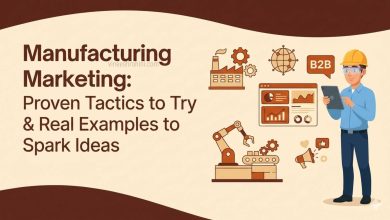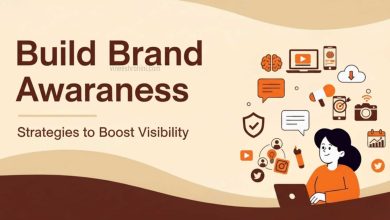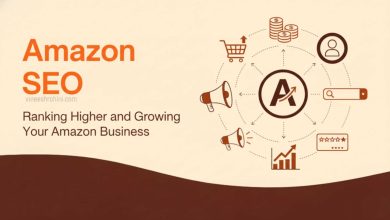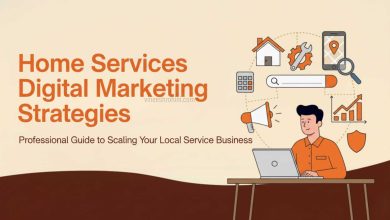The Future of Content Marketing with AI : Comprehensive Guide 2025
Content Marketing with AI : The evolution of digital marketing has always been shaped by technology, but in 2025, artificial intelligence (AI) has become the ultimate game-changer for content marketing. The fusion of AI and content creation has revolutionized how businesses plan, create, distribute, and optimize content. From predictive analytics to AI-driven personalization, the world of content marketing is entering a new era where creativity meets automation.
Table of Contents
In this comprehensive guide, we’ll explore the future of content marketing with AI in 2025, its tools, trends, benefits, and strategies for leveraging artificial intelligence to dominate your marketing efforts.
1. The Rise of AI in Content Marketing

Artificial intelligence has become an essential part of every digital marketing strategy. In 2025, content marketers no longer rely solely on manual research or intuition. AI tools now help analyze massive amounts of data, understand consumer intent, and predict what type of content performs best. With machine learning (ML) algorithms, marketers can identify trends faster, segment audiences more precisely, and automate repetitive tasks like keyword research, SEO optimization, and social media scheduling. The future of content marketing is all about AI-driven decision-making, where data guides creativity to achieve better engagement, conversions, and ROI.
Also Read : How to Create a Powerful Social Media Strategy
2. How AI is Transforming Content Creation
AI has completely changed how content is created. Modern tools like ChatGPT, Jasper, Copy.ai, and Writesonic have made writing faster and more intelligent. These tools don’t just generate text—they analyze your audience, tone, and context to produce personalized, high-quality content. AI can write blog posts, video scripts, ad copies, email campaigns, and even SEO-rich meta descriptions.
In 2025, AI writing tools are enhanced by Natural Language Processing (NLP) and Natural Language Understanding (NLU) capabilities. They can understand human emotions, linguistic nuances, and regional variations, creating content that feels human and relatable. For example, AI can now create interactive storytelling formats and adaptive landing pages that adjust content based on user behavior in real-time.
3. The Role of AI in SEO and Keyword Optimization
Search Engine Optimization (SEO) is one of the biggest beneficiaries of AI. Traditional keyword research has evolved into AI-driven keyword intent analysis. Platforms like Surfer SEO, MarketMuse, and Clearscope use AI to identify content gaps, evaluate competition, and recommend optimization strategies.
AI tools can analyze search trends, voice queries, and user intent across multiple platforms to deliver insights that human marketers can’t easily identify. Moreover, G’s algorithms—powered by AI systems like RankBrain and BERT—prioritize user experience, meaning marketers must produce contextually relevant, high-quality content.
In 2025, voice search optimization and semantic SEO dominate. AI helps marketers craft conversational content optimized for smart assistants like Alexa, G Assistant, and Siri. Predictive analytics tools forecast what topics will trend next, allowing brands to create content before demand peaks—an incredible advantage in the competitive world of digital marketing.
4. AI in Personalization and Customer Experience
Personalization is the heart of content marketing success, and AI is taking it to the next level. AI algorithms analyze user behavior, purchase history, location, and engagement patterns to deliver highly tailored content experiences.
For example, if a user reads articles about affiliate marketing, AI can automatically recommend related topics like “SEO for affiliate sites” or “email marketing for affiliates.” E-commerce brands use AI to personalize product recommendations, email subject lines, and ad creatives for individual users.
In 2025, hyper-personalization has become standard. Machine learning models dynamically adjust content presentation based on real-time engagement. Whether it’s a personalized homepage, chatbot-driven customer service, or individualized blog suggestions—AI ensures every user feels seen and valued. This level of personalization increases conversion rates, customer satisfaction, and lifetime value.
5. Predictive Content Strategy: Using AI to Anticipate Trends
Predictive analytics is one of the most powerful applications of AI in content marketing. Instead of reacting to trends, AI enables marketers to anticipate them. Tools like BuzzSumo, Crayon, and HubSpot’s AI analytics engine can analyze billions of data points across social media, blogs, and search engines to predict which topics, keywords, and formats will perform best.
In 2025, businesses are leveraging AI to determine when to post, what content length works best, and even what emotional tone connects with specific audiences. This data-driven foresight helps brands stay ahead of competitors and produce content that matches future audience interests.
6. AI-Powered Visual and Video Content Creation
Visual content, including videos, infographics, and animations, has always been vital for engagement. AI now plays a central role in designing and editing visuals. Tools like Canva AI, Runway ML, and Synthesia allow marketers to generate professional-grade graphics and videos using simple prompts.
AI-driven video generators can create human-like virtual presenters, edit footage automatically, and generate subtitles in multiple languages. Image recognition and generation technologies, powered by deep learning, can create personalized visuals that align with audience demographics and preferences.
In 2025, AI visual tools also integrate directly with content management systems, enabling brands to produce scalable multimedia campaigns across multiple platforms with minimal human intervention.
7. Chatbots and Conversational AI in Marketing

Chatbots are no longer just customer service tools—they’ve become an essential part of content marketing. AI-powered chatbots help users discover relevant blog posts, recommend content, and even nurture leads. Advanced models use conversational AI to engage users naturally, collect insights, and guide them through the buyer’s journey.
In 2025, businesses use chatbots as part of their inbound marketing strategy. For instance, a user reading about “email marketing automation” might get an AI-powered chatbot recommendation to download a related eBook or join a webinar. These smart assistants boost engagement, reduce bounce rates, and convert visitors into leads.
8. AI and Content Distribution
Creating content is only half the job—distribution is where AI shows its full power. AI tools like Buffer AI, Hootsuite IQ, and Meta Business Suite use algorithms to determine the best time to publish posts, which audience segments to target, and which platforms to prioritize.
In 2025, marketers no longer rely on manual scheduling or random posting. Instead, AI-powered systems analyze engagement data in real-time to adjust posting frequency and optimize visibility. AI also helps manage paid campaigns across G Ads, Meta, and TikTok by dynamically adjusting bids and targeting based on performance.
The result is a more efficient, cost-effective, and impactful content marketing process that drives consistent results.
9. Ethics and Authenticity in AI-Generated Content
As AI becomes more powerful, maintaining authenticity and transparency is critical. In 2025, audiences are more aware of AI-generated content, and they value honesty. Brands must strike a balance between automation and human creativity.
Ethical AI content marketing involves disclosing AI usage when appropriate, avoiding misinformation, and ensuring content diversity. It’s essential to keep a human editorial layer for storytelling, emotional intelligence, and cultural sensitivity. Marketers should treat AI as a creative assistant, not a replacement for human insight.
10. Future Trends in AI-Driven Content Marketing (2025 and Beyond)
The content marketing landscape in 2025 is rapidly evolving. Here are the top future trends reshaping the industry:
- Generative AI Evolution: Advanced AI models will create high-quality long-form content, including blogs, whitepapers, and even video scripts, indistinguishable from human writing.
- AI-Powered Voice Content: With the rise of voice assistants, voice-optimized and audio-based marketing content will become mainstream.
- Interactive and Immersive AI Content: AI will drive augmented reality (AR) and virtual reality (VR) storytelling for deeper brand engagement.
- Predictive Personalization: AI will anticipate customer needs and serve content proactively before users even search for it.
- AI in Influencer Marketing: Predictive analytics will identify ideal influencers based on data-driven audience match instead of follower count.
11. How to Integrate AI into Your Content Marketing Strategy
To stay competitive, brands must strategically implement AI within their content marketing framework. Here’s a roadmap for 2025:
- Audit Your Current Strategy: Identify repetitive tasks that can be automated—like keyword research, social posting, and email segmentation.
- Invest in AI Tools: Use platforms like Jasper for writing, Surfer SEO for optimization, Synthesia for video creation, and HubSpot AI for analytics.
- Leverage Data Insights: Use AI analytics to understand user preferences and adjust your content calendar accordingly.
- Balance Automation and Human Input: Keep creativity and empathy as core human elements while using AI for precision and speed.
- Test and Optimize: Continuously A/B test AI-generated content and monitor performance for consistent improvement.
12. Benefits of Using AI in Content Marketing
AI offers a multitude of benefits that redefine the efficiency and effectiveness of digital campaigns:
- Faster Content Production: Save time by automating repetitive writing and editing tasks.
- Data-Driven Decision Making: Make strategic content choices based on real-time analytics.
- Enhanced SEO Performance: Identify keyword trends and optimize content automatically.
- Improved Audience Engagement: Deliver personalized, relevant experiences at scale.
- Cost Efficiency: Reduce overhead by minimizing manual labor and human error.
13. Challenges and Limitations of AI in Content Marketing
Despite its advantages, AI also has limitations. It may lack creativity, emotional depth, and contextual awareness in certain situations. AI-generated content might sound repetitive or generic without proper human supervision. Additionally, privacy concerns and data dependency pose ethical and regulatory challenges. Marketers must ensure compliance with data protection laws while using AI-driven personalization.
14. The Human-AI Collaboration Model
The future of content marketing is not about AI replacing humans but about enhancing human potential. AI can handle data-heavy tasks, but human marketers bring emotional intelligence, strategic thinking, and creative intuition. Together, they form the perfect combination for powerful content creation.
Successful marketing teams in 2025 will integrate AI as a creative collaborator—using it for research, ideation, and optimization while maintaining human storytelling and authenticity.
Content Marketing with AI Conclusion

The future of content marketing with AI in 2025 is bright, transformative, and full of opportunities. Artificial intelligence empowers marketers to be more creative, efficient, and customer-centric than ever before. By leveraging AI-driven tools for content creation, SEO optimization, personalization, and analytics, brands can deliver smarter, data-backed, and emotionally engaging content that resonates deeply with audiences.
Buy Now : Ecommerce Website
Businesses that embrace this AI revolution today will lead tomorrow’s digital marketing world. Those who combine human creativity with AI precision will dominate content strategies in 2025 and beyond.
Disclaimer: This content is for educational and informational purposes only. The strategies discussed should be adapted according to your business goals and audience insights. Always test AI tools responsibly and maintain human oversight for ethical, transparent content creation.



